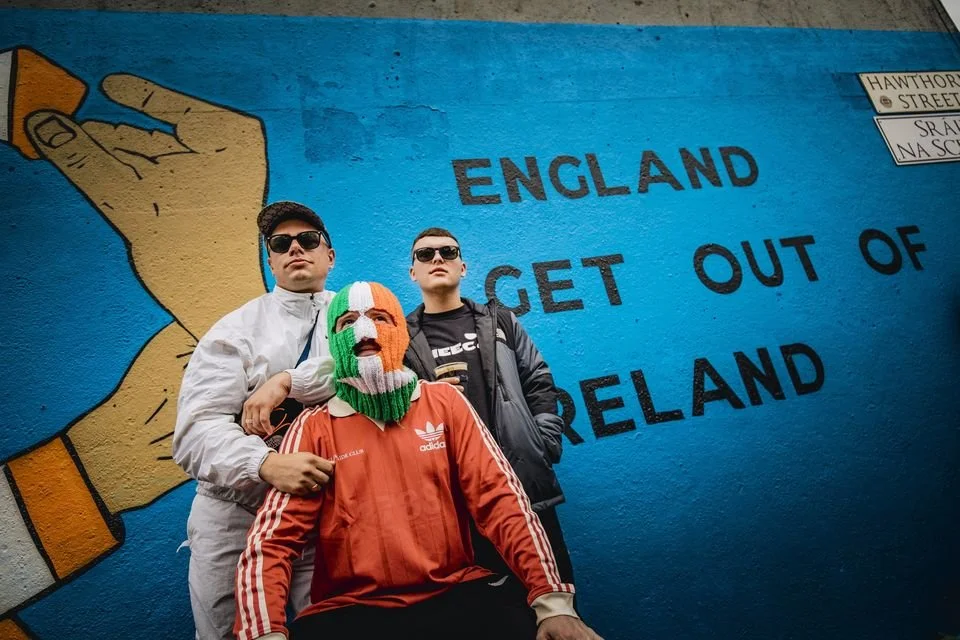KNEECAP
Directing: B+
Acting: B+
Writing: B+
Cinematography: B+
Editing: B+
Kneecap is at times rotely predictable, it stretches truth to fit plot points of a pretty standard story arc, and it tries a little too hard to be 8 Mile crossed with Trainspotting.
That’s about the extent of my criticisms. So let me tell you now why I left this movie incredibly impressed.
This is the story of an Irish rap trio called Kneecap—hence the title, and a reference to paramilitary punishments during “The Troubles” that lasted in Northern Island from the sixties through the nineties. I went into this movie with the vague idea that it was based on a true story, began to have doubts about that due to the plot contrivances, and then found myself taken aback by actual live footage of performances during the end credits, showing what appeared to be the exact same people who played the parts of the three rap band members. I looked it up while leaving, and indeed, vocalists Mo Chara and Móglaí Bap play themselves. It turns out, the comparison to 8 Mile—in which Eminem played himself in a film based on his own rise to rap stardom—is both apt and fair. Except I would argue Kneecap is a better movie.
The third member of the group, DJ Próvai, is played by a a relatively average looking guy who is very believable as a music teacher who discovers the other two kids’ written rhymes in their indigenous Irish language and encourages them to make music out of it. He looks like a guy who fits right in with any indie film out of the United Kingdom. Surely he’s some relatively well-known actor? Nope, he also plays himself (looking a lot more like an average guy in the film than he does in interviews, incidentally).
It’s pretty rare to get a biographical film in which the subjects both play themselves and are good at it. Kneecap does feature some much more famous actual-actors, most notably Michael Fassbender as Móglaí Bap’s father, who faked his own death a decade ago. (I still know very little about the strictly true story of this trio, and have my suspicions as to how “true” the depiction is of this dad character.) The cast also features Simone Kirby as Móglaí’s reclusive mother, and Josie Walker as a violent policewoman so villainous as to be reduced to caricature (okay, so I do have that other criticism). The performances are solid across the board, with those of the three band members as good as any.
And the thing is, Kneecap is undeniably entertaining, from its first to its last shot. It features surprisingly catchy music and beats, and its clever editing and occasional animated flourishes do elicit memories of Trainspotting, but only in complementary ways. The filmmakers openly cite Trainspotting as an influence, and while there is a fine line between homage and artistic theft, Kneecap fits squarely on the side it should.
Director Rich Pepplatt, who cowrote the script with Móglaí Bap and Mo Chara, takes a refreshingly neutral approach to the rap trio’s gleeful drug use, which they defiantly rap about in their lyrics. I might have mixed feelings about all the drug use devoid of consequences, but I also have the wherewithal to know that I am far too removed from its context to judge. Maybe they really are a few hooligans who are wasting their lives with dipshittery, but who am I to know? Kneecap also leans hard on the idea that the group’s defiant use of Irish language is a deeply political act that is changing their society, and I have no idea whether that was ever truly their goal. Either way, it’s an effectively inspirational story idea, and a reflection of real-world struggles of oppressed people.
Here’s something I doubt a whole lot of other people thought about while watching Kneecap: I kept thinking about Sinéad O’Connor, who was alienating listeners by speaking out against Irish injustices decades before the guys in Kneecap were. She has a half-rapped tirade about the Irish Potato Famine on her fourth album, and in 2002 she released a collection of Irish folk songs, several of them in the Irish language. How aware are the Kneecap guys of her career, I wonder? All that said, I would hesitate to assert that Kneecap could never have existed without her, their genres are so completely different. If Kneecap is indebted to anyone, it is American Black rap artists, and to this movie’s credit, there is a brief moment when that debt is directly acknowledged, reflecting a global solidarity of the oppressed.
If nothing else, the film Kneecap makes a deeply valid point, in its message of preserving Indigenous languages, no matter how it’s done. Many of the statements heard in the film by British authority figures arguing against making Irish an officially recognized language are focused on how few people speak it anymore–which only serves as an argument for preserving it. The guys in Kneecap may be rapping in Irish about gleefully hedonistic pursuits, but there’s something to be said for it inspiring listeners to learn the language. If this film itself inspires any more Irish people to learn and keep the language alive, then it has served a dual purpose, being thoroughly entertaining as it furthers a cause.
They’re ready for their close-up: Kneecap plays themselves.
Overall: B+

